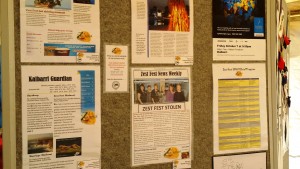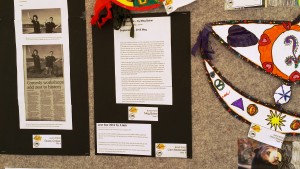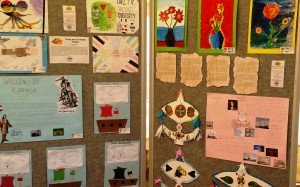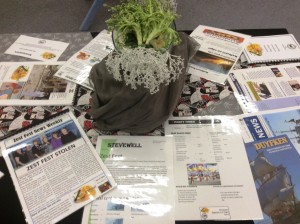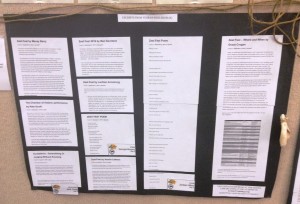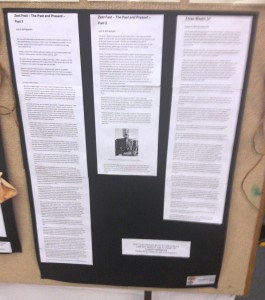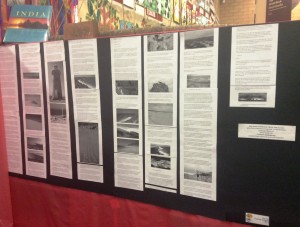A duck walked up to a lemonade stand And he said to the man, running the stand “Hey! (Bum bum bum) Got any grapes?” The man said “No, we just sell lemonade. But it’s cold And it’s fresh And it’s all home-made. Can I get you glass?” The duck said, “I’ll pass.” Then he waddled away. (Waddle waddle) ‘Til the very next day. (Bum bum bum bum Bum da-dum) The duck walked up to the lemonade stand And he said to the man, running the stand, “Hey! (Bum bum bum) Got any grapes? The man said “No, like I said yesterday, We just sell lemonade. OK? Why not give it a try?” The duck said, “Goodbye.” Then he waddled away. (Waddle waddle) Then he waddled away. (Waddle waddle waddle) Then he waddled away (Waddle waddle) ‘Til the very next day. (Bum bum bum bum bum ba-dum) When the duck walked up to the lemonade stand And he said to the man running the stand, “Hey! (bum bum bum) Got any grapes? The man said, “Look, this is getting old. I mean, lemonade’s all we’ve ever sold. Why not give it a go?” The duck said, “How ’bout, no.” Then he waddled away (Waddle waddle) Then he waddled away. (Waddle waddle waddle) Then he waddled away (Waddle waddle) ‘Til the very next day. (Bum bum bum bum bum ba-dum) When the duck walked up to the lemonade stand And he said to the man running the stand, “Hey! (Bum bum bum) Got any grapes?” The man said, “THAT’S IT! If you don’t stay away, Duck, I’ll glue you to a tree and leave you there all day, stuck. So don’t get to close!” The duck said, “Adios.” Then he waddled away. (Waddle waddle) Then he waddled away. (Waddle waddle waddle) Then he waddled away (Waddle waddle) ‘Til the very next day. (Bum bum bum bum bum ba-dum) When the duck walked up to the lemonade stand And he said to the man running the stand, “Hey! (Bum bum bum) got any glue?” “What?” “Got any glue?” “No, why would I– oh!” And one more question for you; “Got any grapes?” (Bum bum bum, bum bum bum) And the man just stopped. Then he started to smile. He started to laugh. He laughed for a while. He said, “Come on duck, let’s walk to the store. I’ll buy you some grapes So you won’t have to ask anymore.” So they walked to the store And the man bought some grapes. He gave one to the duck and the duck said, “Hmm… No thanks. But you know what sounds good? It would make my day. Do you think this store… Do you think this store… Do you think this store…has any… lemonade?”
Monthly Archives: September 2016
The End of the Zest Fest
What a big weekend we had here in Kalbarri with the Zest Fest. I know students could not go to the masquerade ball but I do hope you all made the most of the lovely weather and spent time at the foreshore enjoying the markets, great food and entertainment that was provided over the whole weekend. The Saturday night light show at Red Bluff was also worth visiting. I hope you all enjoyed it, particularly as it is the last one.
Thank you for all your contributions for display. I loved watching the documentaries and reading the blog on the library computers and seeing your work on display in the library and in the foreshore tent. Well done!
My Poet I Recited
My country By Dorothea Mackellar
The love of field and coppice
Of green and shaded lanes,
Of ordered woods and gardens
Is running in your veins.
Strong love of grey-blue distance,
Brown streams and soft, dim skies
I know, but cannot share it,
My love is otherwise.
I love a sunburnt country,
A land of sweeping plains,
Of ragged mountain ranges,
Of droughts and flooding rains.
I love her far horizons,
I love her jewel-sea,
Her beauty and her terror
The wide brown land for me!
The stark white ring-barked forests,
All tragic to the moon,
The sapphire-misted mountains,
The hot gold hush of noon,
Green tangle of the brushes
Where lithe lianas coil,
And orchids deck the tree-tops,
And ferns the warm dark soil.
Core of my heart, my country!
Her pitiless blue sky,
When, sick at heart, around us
We see the cattle die
But then the grey clouds gather,
And we can bless again
The drumming of an army,
The steady soaking rain.
Core of my heart, my country!
Land of the rainbow gold,
For flood and fire and famine
She pays us back threefold.
Over the thirsty paddocks,
Watch, after many days,
The filmy veil of greenness
That thickens as we gaze …
An opal-hearted country,
A wilful, lavish land
All you who have not loved her,
You will not understand
though Earth holds many splendours,
Wherever I may die,
I know to what brown country
My homing thoughts will fly.
Karratha
Last weekend Mum, Dad and I went for a road trip to Karratha to buy a boat that my Dad has been looking at for a while. We left at six in the morning on Saturday and got there at four and on the way we saw some pretty awesome things, such as: ancient rock formations, roadkill and some Wedge tail eagles. For the first couple hours nothing really happened so I got Dad’s laptop out, put a rug over me and watched some movies. We stopped for lunch at Billabong roadhouse and kept driving for a bit, about an hour later Dad’s laptop ran out of juice and I played on my Ipad instead. After driving a little bit more we finally got to Karratha and checked in to the hotel and just lazed around for about half an hour.
After half an hour, we went down to eat dinner. After dinner (and Dessert) we went back to the hotel and went to sleep. The next day we drove to Dampier to meet the guy who was selling the boat, on our way there we saw red dog so we had to go and take a picture of him. After giving the boat a test drive, Mum and I knew Dad was immediately in love with it. After seeing the boat, we went to Kmart to get some stuff. In the end we got everything we needed and some extras. The next day we picked up the boat and drove to Carnarvon because we thought it was a good idea to break up the trip in two days instead on one, and about a hundred kilometers from Carnarvon we popped our trailer tyre. We stayed the night at the Capricorn caravan park. In the morning at about 8 we hit the road and got home about four in the afternoon. It was a longer trip home because we had the boat, but overall it was a really fun weekend and now we have a sick boat.
My Poet
Judith Wright Jordan Hilton
(May 13th 1915 Armidale – June 25th 2000 Canberra)
Judith Wright is an Australian poet, born and raised in New England, NSW. Here she was raised by her father, Phillip Wright and her mother, Ethel, who passed away in 1927. After Phillip was remarried in 1929, Judith stayed with her Aunt and then boarded at New England’s Girls’ School, where she decided to become a poet. She started in Sydney University in 1934. Here she studied philosophy, history, psychology and English without a degree. She became progressively deaf in her twenties and travelled Britain and Europe from 1937 – 1938.
In 1944 Judith became a statistician at the University of Queensland. During World War two she stayed with her father to help on the farms due to the lack of a labour force at the time. At the age of thirty, she met a philosopher by the name of Jack P. McKinney who was 23 years older than her at the time and would become her husband in 1946. They first lived together in a cottage on mount Tambourine and moved later on into a house that was nearby. They were together for many years until Jack died in 1966.
Judith First started to write poems during the late 1930s in some literary books. Her debut poem was called The Moving Image and was published in 1946. Many of her poems at the time were written about wars as they were written during World War 2. One poem, known as ‘The Trains,’ was about the threat of the war that was currently taking place in the pacific. She also wrote many love poems for her husband before and after his death in 1966. A lot of her poetry was also based on the places of which she lived in. New England, Queensland, NSW and the Tambourine Mountains all inspired a lot of her poetry.
This love of the land is what caused Judith to form the Wildlife Preservation Society of Queensland. This society had many campaigns to help preserve many of Australia’s Natural landmarks. They prevented oil drilling around the Great Barrier Reef as it opposed a threat to the ecology of it. Another popular campaign they did was of the prevention of sand drilling on Fraser Island. She sent similar messages through her poems as well. They were about the beauty of nature and how it is critical to ensure that it is maintained.
Judith was quite well known and was highly regarded as a great poet during her career. She edited and assisted many poets. One of them was no other than the aboriginal poet Oodgeroo Noonnuccal. Because of how regarded and talented she was, Judith even won some awards for the poems that she wrote. Some of these awards include the; Graven Leven Prize in 1950, The Robert Frost Memorial Award in 1965 and many more.
Poem Analysis – ‘Trapped Dingo’ By Judith Wright
So here, twisted in steel, and spoiled with red A
your sunlight hide, smelling of death and fear, B
they crushed out your throat the terrible song C
you sang in the dark ranges. With what crying D
you mourned him! – The drinker of blood, the swift death-bringer E
who ran with you so many a night; and the night was long. C
I heard you, desperate poet, did you hear B
my silent voice take up the cry? – replying: D
Achilles is overcome, and Hector dead, A
and clay stops many a warrior’s mouth, wild singer. E
Voice from the hills and the river drunken with rain, A
for your lament the long night was too brief. B
Hurling your woes at the moon, that old cleaned bone, C
till the white shorn mobs of stars on the hill of the sky D
huddled and trembled, you tolled him, the rebel one. E
Insane Andromache, pacing your towers alone, C
death ends the verse you chanted; here you lie. D
The lover, the maker of elegies is slain, A
and veiled with blood her body’s stealthy sun. E
Subject Matter
The poem is about the slow death of a wild dingo by the hands of hunter, specifically through some sort of trap. The poem emphasises that it was slow and very painful for the dingo as it was going into the cry of the dingo and the long nights of avoiding the hunter. But it eventually got caught and now lies in the trap, covered in its own blood, tangled in the steel jaw of the trap. It appears that the poet also had a relationship of some sort, as if they were companions’ maybe.
Purpose/Theme
The purpose of the poem is to express the depression of the dead dingo that comes from the land. That not only the dingo feel lifeless but the land also feels like a part of it has died. That everything can hear it’s mourning and feel its pain. The poet is expressing that through the death of one creature the rest of the land is affected and dies a bit as well. To also express that the poet themself is mourning over the death of the dingo. As if it had been a waste to kill it.
Emotion/Mood
To me, the whole poem felt very monotone and emotionless. But it does show some expression of emotions. It shows a lot of pity for the dead dingo and a lot of depressing tones with the dingo’s moans and the reactions of the land. Beside those moments the whole poems feels very monotone to me.
Poetic Technique
The second verse in the poem uses a large amount of personification on many different inanimate objects. It personifies the river that it is drunk from the rain. The rain is personification of the clouds crying and to express depression. The whole poem has an awkward and inconsistent rhyming pattern to it. By this I mean that you can’t really call it a pattern. Not all of the lines even rhyme in the poem and the rest are all over the place. There is somewhat of a pattern, barely. Those were about the only poem techniques that I could find in the poem.
Summary
Overall the poem, ‘Trapped Dingo’ was a poem written by the poet that I have currently researched. I did a basic poem analysis and concluded to a few things. Firstly, I have concluded that the poem is about a dingo that has been hunted down, trapped and now lies dead. The purpose of the poem is to make the reader feel the pain for the dingo and mourn with the poet and the surrounding outback. The poem used some personification on the surrounding outback to emphasise the feeling of grief and had an unusual rhyming pattern. All and all, I found the poet enjoyable and insightful.
WIlliam Blake
Year 9
English Assignment
Poetry Research Task
Mr William Blake was an English poet, painter as well as a printmaker, (though print making in this day of age, is much more different than what it would have been between the years of 1757-1827.)
William Blake is a 19th century writer and artist who is regarded as a romantic writer. Most of his poems have consisted of romance and other things along the lines of love and romance. Most people believe he wasn’t a very popular or recognised poet in his lifetime but now. He is classified as a seminal figure, this means he is a ‘Strong figure’ in today’s poetry word.
William Blake was born in 1757 on November 28; William Blake grew up in London while George the II was king. This was over 200 years ago and life back then would have been very hard and especially in London things would have been a bit wild. With the European war and the battle of ‘derigan’ led by ‘George the II’ meant that William Blake did grow up in a rough kind of life surrounded by war. William Blake was the second son to men’s clothing merchant. William Blake’s Biography said that William was often beaten and hit by his father. William Blake had written poems from an early age and later in his life time. At the age of 21 he went to the Royal academy of Arts and soon quit the academy due to his thought on the rules and how they didn’t agree with him so he quit.
When he was 24 he fell in love with the girl of his dreams, Catherine Sophia Boucher, Who was unable to read or write so William Blake taught her how to read and write, even draw and colour his designs for his prints. William Blake never got with a lot of women and Catherine Boucher was soon his beloved wife for the next 45 years till his death. Although a lot of things happened between his marriage and death like the sad loss of his brother Robert Blake who died in 1787 due to tuberculosis only at the age of 24. (Tuberculosis is a type of lung disease.)
P O E M S_
Once the death of Robert Blake-William Blake’s brother, William thought to of seen visions and spiritual connections with his brother who gave him ideas on new poems and taught him a new way to write them. ‘Illuminated Printing.’ this method allowed Blake to control every aspect of the production of his art. William wrote poetry at young age of about 14, the same as me. He then pursued that creativeness and wrote many poems of love and romance about his brother and wife. His daily life and other things that weren’t always so romantic. Even though he wasn’t really a big poet in his time like shakespear or judith write. He has grown to quite a popular poet In todays poetry era. And many of his poems are loved and chershed by thouands of people.
A Divine Image
Cruelty has a human heart,
And Jealousy a human face;
Terror the human form divine,
And Secrecy the human dress.
The human dress is forged iron,
The human form a fiery forge,
The human face a furnace sealed,
The human heart its hungry gorge.
-William Blake
P o e t r y A n a l y s I s
1. The poems subject matter; is mainly in my opinion focusing on a human and it’s harshness it’s feeling and it been referred to bad or horror images/vocabulary. It’s referring the human life to things like fear, suffering and terror. Maybe he wrote this because of the things going on around him at that time like the European war. Or simply something that has upset him so he wrote about that.
2. The purpose or theme of this poem was mainly on the negative-ness of a human and there consciousness which. But I think it’s just mainly focusing on the things that were going around William Blake at that time.
3. The emotion is kind of a sad poem but it doesn’t really make you sad it kind of makes you worried or stressed maybe a bit angry at the humans for what they must of done to be written about in that way. Really it just depends on how you looked at it and how it affected you at that time.
Student Blogging Challenge
During Term 4, the Year 9 (and a couple of year 8) Student Bloggers will be connecting with other student bloggers around the world in a Blogging Challenge. This challenge is designed to increase blogging and writing skills and is a good opportunity for these students. The challenge is controlled through an education platform and completely safe and secure. Students will be able to complete some of the activities in class.
At the same time, the rest of the students in years 8 and 9 will be taking part in a Class Blogging Challenge which operates in a very similar way.
I will be overseeing both these challenges.
Geraldton Regional Library
Last week the year 8 students had a tour of the library in Geraldton. It is a lovely building with lots of resources as well as an area for teenagers. This colourful area has books and magazines for young adults as well as an X Box which is available for use in school holidays. There are books, magazines and DVDs on every subject as well as a designated study area, Family History section and free wifi.
The students in years 8 and 9 have been given a library card for Kalbarri Library and learned that they can use this to download e-books, movies and magazines online. To do this, they must log onto the Northampton Shire website, click on ‘Shire Facilities, then ‘Library’. Students will need to put in their card number and use the last four digits as their password.
Wagoe
So on Sunday, I went to wagoe with my family to help out again. This time we went there to help tag the goats and separate the sheep. Well, me and dad and helped, we told mum she didn’t need to help so she just had a chat. Sonny was pretty cautious with going anywhere near the goats after his last experience with them.
On Wednesday we went to move the goats from across the road into one of my uncles enclosures. While doing that one of the goats ran straight into him and hit him directly into the testicles. After that he’s a lot more cautious and it was pretty funny to witness the entire thing.
So the three of us (My Uncle, Dad and I) all jumped into the pen and got started. What we would have to do is we would grab one of the goats by the horn and hold down it in between your legs until my uncle put the tag through it’s ear and like puncture the other.
There weren’t too many goats to tag, only about 38 or so. It wasn’t too tedious or anything like that as most of the goats were nanny goats or only little. The little goats were harder to catch and hold onto in my opinion. They didn’t have very big horns so you could hardly grab onto them there.
After we tagged all the goats we had a bit of lunch and headed off to sort out the sheep. I got to drive over there in Dad’s land cruiser which was fun to do and it’s good to learn in as its a manual but not too difficult to drive around in.
You wouldn’t think it but there were about five hundred sheep in one pen and we had to separate the ones that my uncle were going to sell the next day and the ones that he was keeping.
This was too difficult either and the whole thing was quite fun. We stayed there till about five thirty then headed home.
zest fest 2016 by Liam
The 2016 zest festival will be the last one since starting in 2012 .
This year the zest festival marks the 400th anniversary of the landing of Dutch Captain Dirk Hartog in WA. On 25th October 1616 Dirk and his crew reached Cape Inscription in the Shark Bay area.
The theme this year is Eendracht (the name of Dirk Hartogs ship) which means unity and will celebrate young sailors, explorers and women of the era who waited for their loved ones.
The zest festival is a great time to get together with family and spend the weekend learning about are history, watching performances and eating food.

